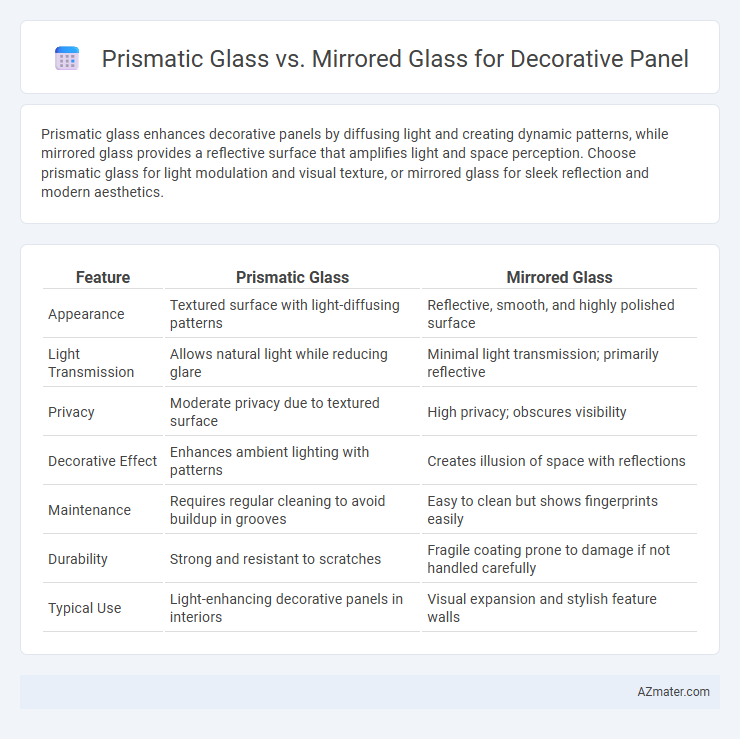Prismatic glass enhances decorative panels by diffusing light and creating dynamic patterns, while mirrored glass provides a reflective surface that amplifies light and space perception. Choose prismatic glass for light modulation and visual texture, or mirrored glass for sleek reflection and modern aesthetics.
Table of Comparison
| Feature | Prismatic Glass | Mirrored Glass |
|---|---|---|
| Appearance | Textured surface with light-diffusing patterns | Reflective, smooth, and highly polished surface |
| Light Transmission | Allows natural light while reducing glare | Minimal light transmission; primarily reflective |
| Privacy | Moderate privacy due to textured surface | High privacy; obscures visibility |
| Decorative Effect | Enhances ambient lighting with patterns | Creates illusion of space with reflections |
| Maintenance | Requires regular cleaning to avoid buildup in grooves | Easy to clean but shows fingerprints easily |
| Durability | Strong and resistant to scratches | Fragile coating prone to damage if not handled carefully |
| Typical Use | Light-enhancing decorative panels in interiors | Visual expansion and stylish feature walls |
Introduction to Decorative Glass Panels
Decorative glass panels transform interior spaces by combining functionality with aesthetic appeal, with prismatic and mirrored glass being popular choices. Prismatic glass enhances natural light diffusion through its geometric patterns, creating dynamic visual effects and reducing glare. Mirrored glass offers reflective surfaces that amplify space perception and add elegance, often used to create depth and sophistication in modern design.
What is Prismatic Glass?
Prismatic glass is designed with a textured surface that refracts and diffuses light to create vibrant, multi-dimensional visual effects, making it ideal for decorative panels. Unlike mirrored glass, which reflects clear images and enhances brightness through reflective surfaces, prismatic glass manipulates light internally to produce colorful patterns and reduce glare. This unique light diffusion property of prismatic glass enhances privacy while adding artistic flair to interiors and architectural designs.
What is Mirrored Glass?
Mirrored glass is a reflective surface created by applying a thin metallic coating, usually silver or aluminum, to one side of a glass pane, enhancing its aesthetic appeal and functionality in decorative panels. This type of glass offers high reflectivity, providing a sleek, modern look while also contributing to light distribution and privacy within interior spaces. Compared to prismatic glass, mirrored glass focuses more on reflection and elegance rather than light diffusion or pattern effects.
Aesthetic Appeal: Prismatic vs Mirrored Glass
Prismatic glass enhances decorative panels with a dynamic, light-diffusing effect that creates vibrant patterns and a textured aesthetic, offering depth and visual interest in various lighting conditions. Mirrored glass provides a sleek, reflective surface that amplifies spatial perception and adds a modern, polished look, making spaces appear larger and brighter. Both materials serve distinctive aesthetic purposes: prismatic glass emphasizes light play and complexity, while mirrored glass focuses on reflection and clarity.
Light Reflection and Diffusion Properties
Prismatic glass features a textured surface that enhances light diffusion, creating a soft, evenly distributed illumination ideal for decorative panels requiring glare reduction. Mirrored glass offers high light reflection with a smooth, reflective surface, producing sharp reflections and increasing brightness but less diffusion. Selecting prismatic glass optimizes ambient lighting with subtle diffusive effects, whereas mirrored glass maximizes reflective clarity and visual impact.
Privacy Features Comparison
Prismatic glass offers enhanced privacy by diffusing light and obscuring clear visibility while maintaining natural illumination for decorative panels. Mirrored glass provides superior privacy through reflective surfaces that prevent direct viewing from one side, ideal for spaces requiring full concealment. Both options improve decor aesthetics, but prismatic glass balances light transmission with privacy, whereas mirrored glass prioritizes maximum privacy with reduced transparency.
Durability and Maintenance
Prismatic glass offers enhanced durability due to its thicker surface and resistance to scratches, making it ideal for high-traffic decorative panels in commercial spaces. Mirrored glass, while visually striking with its reflective qualities, is more prone to surface damage and requires frequent cleaning to maintain its appearance. Maintenance of prismatic glass is generally easier since it hides dust and fingerprints better, reducing the need for constant upkeep compared to mirrored glass panels.
Popular Applications in Interior Design
Prismatic glass enhances interior design by diffusing light to create a soft, multidirectional glow, making it ideal for partitions, privacy screens, and feature walls in residential and commercial spaces. Mirrored glass is widely used for decorative panels in retail stores, hotels, and modern offices to amplify space perception and reflect surrounding decor, adding depth and sophistication. Both materials serve crucial roles in accentuating aesthetics and functional lighting within contemporary interiors.
Cost and Installation Factors
Prismatic glass typically costs more than mirrored glass due to its complex light-diffusing patterns and specialized manufacturing process. Installation of prismatic glass demands precise alignment and handling to preserve its optical properties, often increasing labor time and expense compared to the easier-to-install mirrored glass. Mirrored glass panels offer a cost-effective solution with straightforward installation, making them a popular choice for budget-conscious decorative projects.
Choosing the Right Glass for Your Decorative Panels
Prismatic glass enhances decorative panels with textured light diffusion and increased privacy, making it ideal for spaces requiring subtle illumination without clear visibility. Mirrored glass offers reflective surfaces that amplify natural light and create an illusion of spaciousness, perfect for accentuating design elements and adding a contemporary feel. Selecting the right glass hinges on the desired balance between light transmission, privacy, and aesthetic impact in your interior or architectural application.

Infographic: Prismatic glass vs Mirrored glass for Decorative panel
 azmater.com
azmater.com